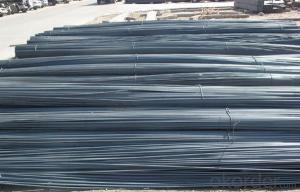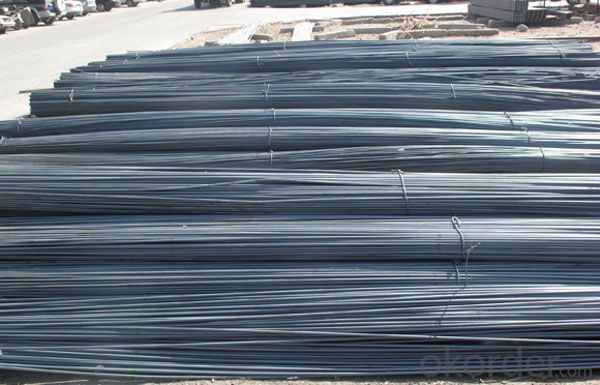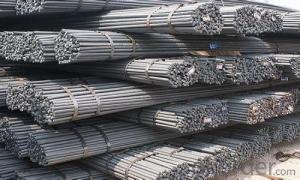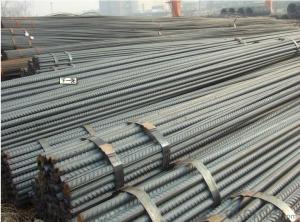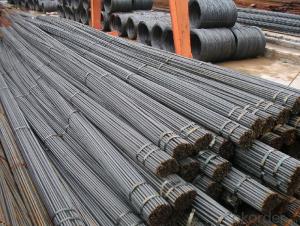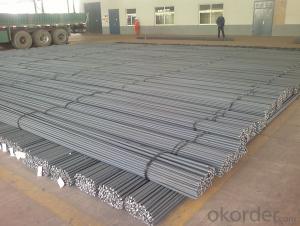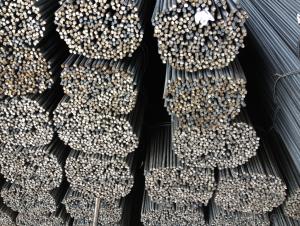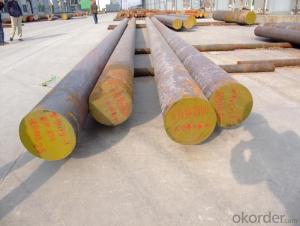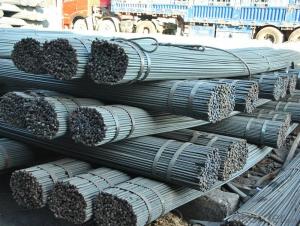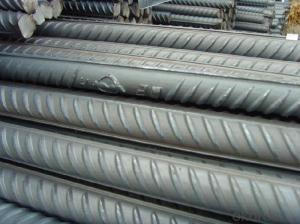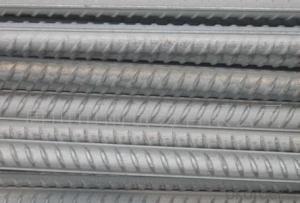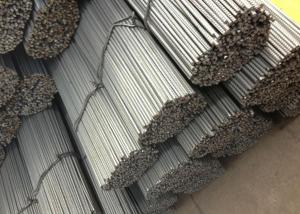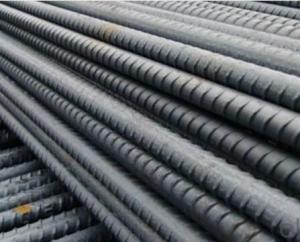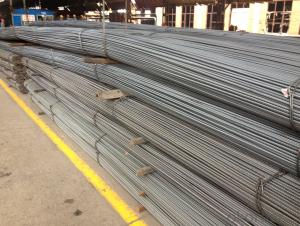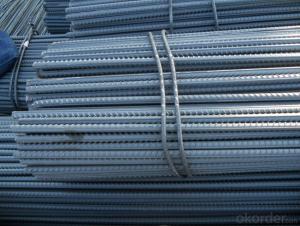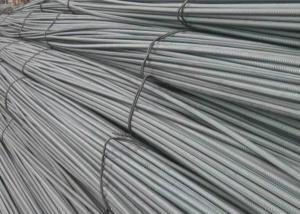Steel Rebar,Deformed Steel Bar,Iron Rods For Construction/Concrete
- Loading Port:
- Shanghai
- Payment Terms:
- TT OR LC
- Min Order Qty:
- 100 m.t.
- Supply Capability:
- 1000 m.t./month
OKorder Service Pledge
OKorder Financial Service
You Might Also Like
deformed steel bar grade 40
material: HRB400, BS4449 GR460B
size: 8-36mmx12m.
short delivery time by bulk or container
deformed steel bar grade 40
material: HRB400, BS4449 GR460B
size: 8-36mmx12m.
short delivery time with bulk or container
packing: Mill standard export packing in bundles/coil, around 2tons/bundle.
country of Origin: China
delivery Time: Within a 35 days
Shipment: by bulk vessel or by container
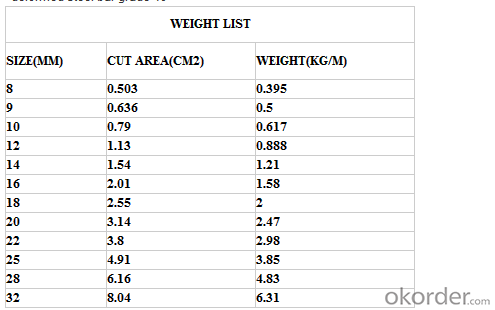
Leading goods:
section steel:angles,channels,I-beam,H-beam;
coils:cold/hot rolled coils,PPGI,galvanized coils,plate,checkered plate,cutting steel plate,steel strip;
wire rod:steel wire,deformed wire,bar;
pipe:seamless pipe,rectangular pipe,welded pipe,spiral welded pipe,pipe fittings;
stainless steel:steel sheets,stainless steel strips,stainless bar,stainless tube;
special:weathering steel,shipbuilding steel;
construction steel:C-channel,Z-channel,T-bar,high-speed divider plate,corrugated steel plate,steel grating.
Advantage:
We are the spot supplier, Six huge warehouses which can hold 20,000 MT goods.
It makes the cost lower than others,we can provide the competitive price for you.
Delivery time:
Normal sizes can be provided in 7days, the others should be ready in 30---45 days.
Further treatment:
We can offer cutting,painting,drilling holes,bending,threading, welding,galvanization,packing etc.
Security interest:
We have already passed the ISO9001, BV and SGS authentication which makes the quality secured.
If you have the interest in any of the products we can provided, pls don't hesitate to connect with me. Looking forward to cooperate with you.
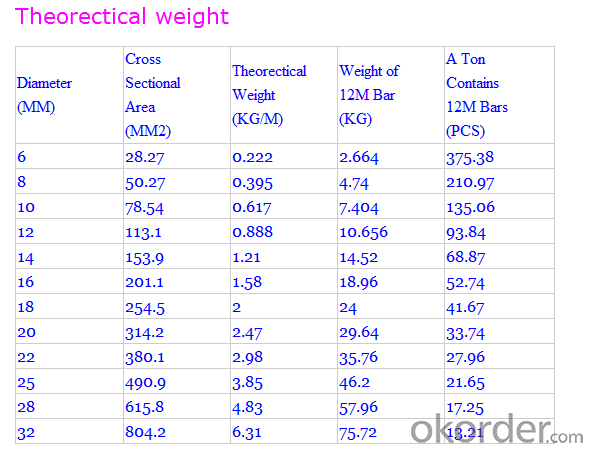
FAQ of Steel Deformed Bar
1. More than 10 years experience in this industry
2. 100,000 tons exporting per month
3. Professional foreign trade tea
4. OEM&ODM capacity
5. High quality assured & competitive price
6. Try our best to meet your needs & save your budget
7. Very popular in Southeast Asia, Africa, Mid-East and South America etc.
8. VIP membership system, first time customers and long-term cooperation customers can get extra discount on some products.
- Q: Are steel rebars suitable for use in seismic zones?
- Yes, steel rebars are suitable for use in seismic zones. Steel rebars are commonly used in construction projects in seismic zones due to their high strength and ductility properties. During an earthquake, buildings and structures experience significant stress and movement, and steel rebars help to reinforce the concrete and provide additional strength and flexibility. This helps to absorb and distribute the energy generated during seismic events, reducing the risk of structural damage or collapse. Additionally, steel rebars are also resistant to corrosion, which is crucial in areas prone to seismic activity as the reinforcement must maintain its integrity over time. Overall, using steel rebars in seismic zones is an effective way to enhance the safety and durability of structures in these high-risk areas.
- Q: What are the guidelines for the proper anchoring of steel rebars in slabs?
- To ensure the structural integrity and strength of a concrete slab, it is crucial to properly anchor steel rebars. Here are some guidelines to consider: 1. Embedment depth: The concrete slab should have a specific depth of embedding for the rebars. This depth is determined based on factors like rebar size, strength, and load requirements. It is essential to adhere to the recommended embedment depth to ensure effective force transfer between the rebar and concrete. 2. Spacing: Within the slab, rebars should be evenly spaced at regular intervals to provide uniform reinforcement. The spacing is determined by design requirements and expected load. Following the suggested spacing guidelines will distribute the load evenly, preventing slab cracking or failure. 3. Lap length: When joining multiple rebars together, a lap splice is employed. The lap length refers to the minimum overlap required for proper force transfer between rebars. It is crucial to adhere to the specified lap length to maintain reinforcement integrity. 4. Edge distance: To prevent edge failure, rebars should be placed at a specific distance from the slab's edges. Edge distance is determined by factors such as bar size, concrete cover, and design requirements. Adhering to the recommended edge distance ensures proper anchoring, preventing concrete spalling or cracking near the edges. 5. Concrete cover: Rebars require a minimum concrete cover for corrosion protection and fire resistance. The concrete cover is the distance between the rebar's outer surface and the nearest concrete surface. Following the suggested concrete cover guidelines maintains the durability and longevity of steel rebars. 6. Accurate placement and alignment: Proper reinforcement is achieved by accurately placing and aligning rebars within the slab. They should be positioned at the correct depth, spacing, and alignment as per design specifications. This ensures secure anchoring and contributes to the overall strength of the slab. It is important to note that these guidelines may vary based on project requirements, local building codes, and design standards. Therefore, it is recommended to consult a qualified structural engineer or follow guidelines provided by relevant authorities to ensure proper anchoring of steel rebars in slabs.
- Q: What is the role of steel rebars in the construction of multi-level car parks?
- The role of steel rebars in the construction of multi-level car parks is to provide reinforcement and strength to the concrete structures. Rebars are incorporated within the concrete to enhance its tensile strength, durability, and resistance to cracking or collapsing under heavy loads. They help distribute the weight and stress evenly, ensuring the structural integrity of the car park and ensuring it can safely support multiple levels of vehicles.
- Q: How do steel rebars contribute to the stability of a structure?
- Steel rebars contribute to the stability of a structure by providing reinforcement to the concrete. They enhance the structural strength and integrity of the building, by increasing its resistance to tension, compression, and bending forces. The rebars prevent cracks and failure in the concrete under heavy loads, improving the overall durability and safety of the structure.
- Q: Can steel rebars be used in modular bridges?
- Yes, steel rebars can be used in modular bridges. Steel rebars are commonly used in the construction of bridges due to their strength, durability, and ability to handle heavy loads. They provide reinforcement to the concrete components of the bridge, ensuring its structural integrity. In modular bridge construction, steel rebars are often incorporated into precast concrete elements, allowing for efficient and cost-effective assembly of the bridge modules.
- Q: How are steel rebars protected against damage from seismic events?
- Steel rebars are protected against damage from seismic events through various measures such as using seismic-resistant structural designs, proper reinforcement detailing, and ensuring adequate concrete cover. Additionally, special seismic design codes and guidelines are followed, which include using seismic-resistant materials, such as epoxy-coated rebars, to enhance their corrosion resistance and overall durability.
- Q: What are the guidelines for repairing damaged steel rebars in a structure?
- When it comes to repairing damaged steel rebars in a structure, there are several guidelines that need to be followed to ensure the structural integrity of the building. Here are some key guidelines: 1. Inspection: Before starting the repair process, a thorough inspection of the damaged rebars should be conducted. This includes assessing the extent of the damage, identifying the cause of the damage, and determining whether repair is feasible or if replacement is required. 2. Cleaning: The damaged rebars need to be cleaned properly to remove any loose rust, scale, or other contaminants. This can be done using wire brushes, sandblasting, or other appropriate cleaning methods. 3. Removal of damaged material: Any corroded or severely damaged portions of the rebars should be removed. This may involve cutting out the damaged area and replacing it with a new rebar, or using techniques such as welding or epoxy bonding to repair the damaged section. 4. Surface preparation: The surface of the rebars should be prepared to ensure proper adhesion of the repair material. This may involve roughening the surface, applying a bonding agent, or using other surface preparation techniques depending on the specific repair method being employed. 5. Repair material selection: The choice of repair material will depend on factors such as the severity of the damage, the load-bearing capacity required, and the environment in which the rebars are located. Common repair materials include epoxy resins, cementitious mortars, or other specialized repair products. 6. Repair technique: The repair technique chosen should be appropriate for the specific damage and should comply with relevant industry standards and codes. Techniques such as welding, epoxy bonding, or mechanical splicing can be used to repair damaged rebars. 7. Quality control: Throughout the repair process, quality control measures should be implemented to ensure the effectiveness and durability of the repair. This may involve testing the repaired rebars for strength, monitoring the curing process, and conducting inspections to verify that the repairs have been carried out in accordance with the guidelines. 8. Documentation: It is essential to maintain thorough documentation of the repair process, including photographs, test results, and any relevant certifications or warranties. This documentation can be useful for future reference, maintenance, and to provide evidence of the repair work done. It is important to note that the guidelines for repairing damaged steel rebars may vary depending on the specific requirements of each project, local building codes, and the recommendations of structural engineers or repair specialists. Therefore, it is crucial to consult with experts in the field to ensure that the repair work is carried out safely and effectively.
- Q: Are steel rebars suitable for use in high-rise buildings?
- Yes, steel rebars are suitable for use in high-rise buildings. Steel rebars, also known as reinforcing bars, are commonly used in the construction industry to provide strength and stability to concrete structures. High-rise buildings require a strong and durable structural system to withstand various loads and forces such as wind, earthquakes, and the weight of the building itself. Steel rebars offer excellent tensile strength and ductility, making them ideal for reinforcing concrete in high-rise structures. One of the key advantages of steel rebars is their ability to resist tensile forces. Concrete is strong in compression but weak in tension, and steel rebars help counteract this weakness by providing the necessary tensile strength. This is crucial in high-rise buildings where the weight of the structure can cause tension on the concrete elements. By reinforcing the concrete with steel rebars, the overall structural integrity of the building is enhanced, ensuring its safety and stability. Additionally, steel rebars have superior ductility, which is the ability to deform under stress without fracturing. This property is essential in high-rise buildings as they are subject to dynamic loads and potential movements caused by factors like wind or seismic activity. Steel rebars can absorb and distribute these forces, reducing the risk of structural failure or collapse. Furthermore, steel rebars are readily available and cost-effective compared to alternative materials such as carbon fiber or fiberglass. They can be easily fabricated and installed in various shapes and sizes to fit the specific design requirements of high-rise buildings. However, it is important to note that the suitability of steel rebars in high-rise buildings also depends on proper design, installation, and regular maintenance. It is crucial to follow the relevant building codes and standards, ensure proper corrosion protection, and conduct regular inspections to detect any potential issues. By adhering to these practices, steel rebars can provide a reliable and durable reinforcement solution for high-rise buildings.
- Q: Are steel rebars suitable for use in structures with high resistance to impact?
- Steel rebars are generally suitable for use in structures with high resistance to impact. Rebars, also known as reinforcement bars, are made from steel and are commonly used in concrete structures to enhance their strength and durability. Steel is known for its high tensile strength and ability to absorb and distribute impact forces, making it an ideal material for reinforcement. In structures that are prone to impact, such as bridges, highways, or buildings located in earthquake-prone areas, steel rebars play a critical role in providing additional strength and resistance. The use of rebars ensures that the structure can withstand sudden impact loads and prevent catastrophic failures. Moreover, steel rebars are available in various grades and sizes, allowing engineers to select the appropriate type of rebar based on the specific requirements of the structure. Higher grade rebars, such as Grade 60 or Grade 75, offer increased strength and ductility, making them even more suitable for structures with high resistance to impact. It is important to note that while steel rebars enhance the overall strength and impact resistance of a structure, other factors such as design, construction techniques, and maintenance also play vital roles in ensuring the structure's ability to withstand impact forces. Therefore, a comprehensive approach that considers all these factors is essential in designing and constructing structures with high resistance to impact.
- Q: Can steel rebars be used in historical bridge restoration?
- Historical bridge restoration projects can benefit from the use of steel rebars. Over time, many historical bridges may have experienced deterioration or damage, and steel rebars can play a crucial role in providing strength and stability during the restoration process. Reinforced concrete structures often rely on steel rebars, which effectively reinforce the structural integrity of the bridge. Nevertheless, it is essential to carefully consider the historical bridge's aesthetics and guarantee that the incorporation of steel rebars does not compromise its historical value or appearance. Preservation guidelines and consultations with historical experts can prove invaluable in determining the suitable application of steel rebars in historical bridge restoration endeavors.
Send your message to us
Steel Rebar,Deformed Steel Bar,Iron Rods For Construction/Concrete
- Loading Port:
- Shanghai
- Payment Terms:
- TT OR LC
- Min Order Qty:
- 100 m.t.
- Supply Capability:
- 1000 m.t./month
OKorder Service Pledge
OKorder Financial Service
Similar products
Hot products
Hot Searches
Related keywords
